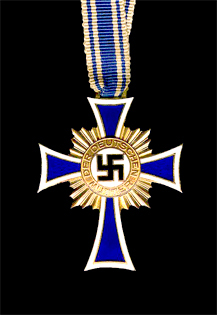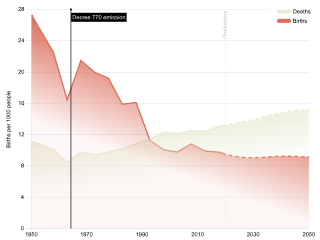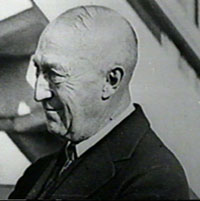 W
WBryan Douglas Caplan is an American behavioral economist and author. Caplan is a professor of economics at George Mason University, research fellow at the Mercatus Center, adjunct scholar at the Cato Institute, and former contributor to the Freakonomics blog; he also publishes his own blog, EconLog. He is a self-described "economic libertarian". The bulk of Caplan's academic work is in behavioral economics and public economics, especially public choice theory.
 W
WNicolae Ceaușescu was a Romanian communist politician and leader. He was the general secretary of the Romanian Communist Party from 1965 to 1989, and the second and last Communist leader of Romania. He was also the country's head of state from 1967, serving as President of the State Council and from 1974 concurrently as President of the Republic, until his overthrow and execution in the Romanian Revolution in December 1989, part of a series of anti-Communist and anti-Soviet uprisings in Eastern Europe that year.
 W
WChild harvesting or Baby harvesting refers to the systematic sale of human children, typically for adoption by families in the developed world, but sometimes for other purposes, including trafficking. The term covers a wide variety of situations and degrees of economic, social, and physical coercion. Child harvesting programs or the locations at which they take place are sometimes referred to as baby factories or baby farms.
 W
WThe Cross of Honour of the German Mother, referred to colloquially as the Mutterehrenkreuz or simply Mutterkreuz, was a state decoration conferred by the government of the German Reich to honour a Reichsdeutsche German mother for exceptional merit to the German nation. Eligibility later extended to include Volksdeutsche mothers from, for example, Austria and Sudetenland, that had earlier been incorporated into the German Reich.
 W
WIn Judaism, Christianity, and some other Abrahamic religions, the cultural mandate is the divine injunction found in Genesis 1:28, in which God, after having created the world and all in it, ascribes to humankind the tasks of filling, subduing, and ruling over the earth. The cultural mandate includes the sentence "Be fruitful and multiply and fill the Earth." The cultural mandate is given to Adam and Eve.
 W
WDecreței are Romanians born in the late 1960s and 1970s, shortly after the communist regime of Nicolae Ceaușescu issued Decree 770, aimed at the creation of a new and large Romanian population by restricting abortion and contraception.
 W
WThe Free and Independent Faction or Free and Independent Fraction was a nationalist and national-liberal party in Romania, regionally centered on Western Moldavia. Originally informal, and defined by its adversaries, the Faction mainly comprised pupils and followers of the philosopher Simion Bărnuțiu. During most of its existence, it had as its recognized leader the academic and polemicist Nicolae Ionescu.
 W
WThe Great Stork Derby was a contest held from 1926 to 1936. Female residents of Toronto, Ontario, Canada, competed to produce the most babies in order to qualify for an unusual bequest in a will. The race was the product of a scheme by Charles Vance Millar (1853–1926), a Toronto lawyer, financier, and practical joker, who bequeathed the residue of his significant estate to the woman in Toronto who could produce the most children in the decade following his death.
 W
WEnver Hoxha was an Albanian politician who served as the First Secretary of the Party of Labour of Albania, from 1941 until his death in 1985. He was also a member of Politburo of the Party of Labour of Albania, chairman of the Democratic Front of Albania, commander-in-chief of the armed forces from 1944 until his death. He served as the 22nd Prime Minister of Albania from 1944 to 1954 and at various times served as foreign minister and defence minister of People's Socialist Republic of Albania as well.
 W
WLebensborn e.V. was an SS-initiated, state-supported, registered association in Nazi Germany with the goal of raising the birth rate of Aryan children of persons classified as 'racially pure' and 'healthy' based on Nazi racial hygiene and health ideology. Lebensborn provided welfare to its mostly unmarried mothers, encouraged anonymous births by unmarried women at their maternity homes, and mediated adoption of these children by likewise 'racially pure' and 'healthy' parents, particularly SS members and their families. The Cross of Honour of the German Mother was given to the women who bore the most Aryan children. Abortion was legalised by the Nazis for disabled children, but strictly punished otherwise.
 W
WThe Médaille de la Famille française is a decoration awarded by the government of France to honour those who have successfully raised several children with dignity. The decoration was created by a decree of May 26, 1920, under the name Médaille d'honneur de la famille française, with the aim of honouring mothers of large families. Although the medal rewards those with large families, the children must be "raised well" and the eldest be at least 16 years old.
 W
WMother Heroine was an honorary title in the Soviet Union awarded for bearing and raising a large family. The state's intent was not only to honor such large families but also to increase financial assistance for pregnant women, mothers of large families, and single mothers, and to promote an increased level of health in mother and child. The award was established in 1944 and continued to exist until the fall of the Soviet Union in 1991.
 W
WNazi Germany, officially known as the German Reich until 1943 and Greater German Reich in 1943–45, was the German state between 1933 and 1945, when Adolf Hitler and the Nazi Party controlled the country which they transformed into a dictatorship. Under Hitler's rule, Germany quickly became a totalitarian state where nearly all aspects of life were controlled by the government. The Third Reich, meaning "Third Realm" or "Third Empire", alluded to the Nazis' conceit that Nazi Germany was the successor to the earlier Holy Roman Empire (800–1806) and German Empire (1871–1918). The Third Reich, which Hitler and the Nazis referred to as the Thousand Year Reich, ended in May 1945 after just 12 years, when the Allies defeated Germany, ending World War II in Europe.
 W
WThe Order of Maternal Glory was a Soviet civilian award commemorating mothers with a substantial number of children, created on 8 July 1944 by Joseph Stalin and established with a decision of the Presidium of Supreme Soviet of the USSR. Its status was confirmed by the Soviet's decision of 18 August 1944 and later modified by 16 September 1947, 28 May 1973 and 28 May 1980 decisions. It was awarded on behalf of the Presidium of Supreme Soviet of the USSR through decrees of local Soviet presidencies.
 W
WThe Order of Parental Glory is a state award of the Russian Federation. It was established on May 13, 2008 by presidential decree 775 to reward deserving parents of exceptionally large families. It can trace its origins to the Soviet Order "Mother Heroine". The Order's statute was amended on September 7, 2010 by presidential decree 1099, the same document that established the Medal of the Order of Parental Glory.
 W
WRace suicide was an alarmist term used in eugenics, coined in 1900 by the sociologist Edward A. Ross. Racial suicide rhetoric suggested a differential birthrate between native-born Protestant and immigrant Catholic women, or more generally between the "fit" or "best,", and the "unfit" or "undesirable", such that the "fit" group would ultimately dwindle to the point of extinction. Belief in race suicide is an element of nordicism. In anti-East Asian discourse, the concept is associated with the "Yellow Peril".
 W
WReichsbund der Kinderreichen, Reich's Union of Large Families or literally: Reich's League of those wealthy in children, was one of the most important pronatalist groups founded in Germany after World War I. To qualify as a member of this league a family should have at least four children. Widows were also admitted.
 W
WThe Socialist Republic of Romania was a Marxist-Leninist one-party communist state that existed officially in Romania from 1947 to 1989. From 1947 to 1965, the state was known as the Romanian People's Republic. The country was a Soviet-aligned Eastern Bloc state with a dominant role for the Romanian Communist Party enshrined in its constitutions. Geographically, Romania bordered the Black Sea to the east; the Soviet Union to the north and east; Hungary and Yugoslavia to the west and Bulgaria to the south.
 W
WWomen in Nazi Germany were subject to doctrines of Nazism by the Nazi Party (NSDAP), which promoted exclusion of women from the political life of Germany as well as its executive body and executive committees. On the other hand, whether through sheer numbers, lack of local organization, or both, many German women did indeed become Nazi party members. In spite of this, the Nazi regime (officially) only permitted and encouraged women to fill the roles of mother and wife; women were excluded from all positions of responsibility, notably in the political and academic spheres.